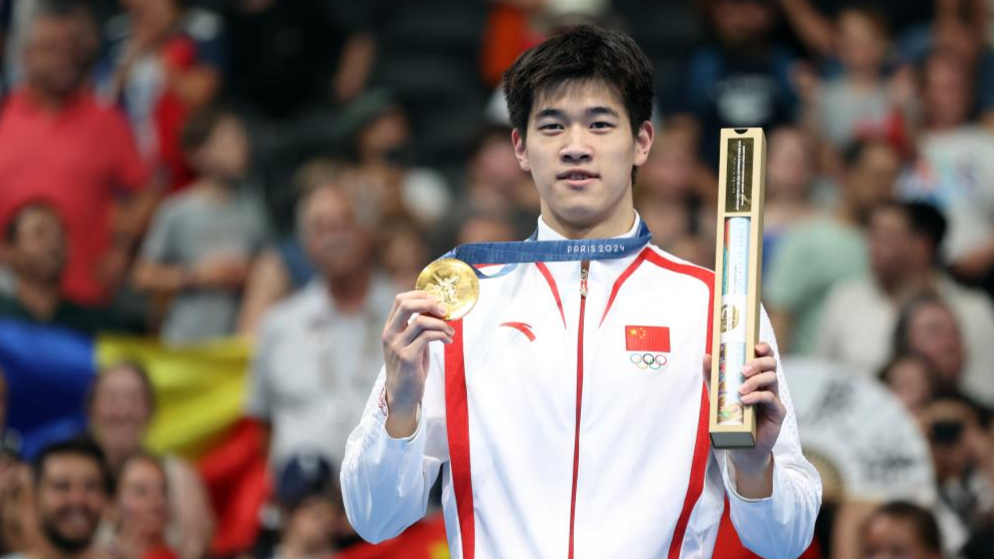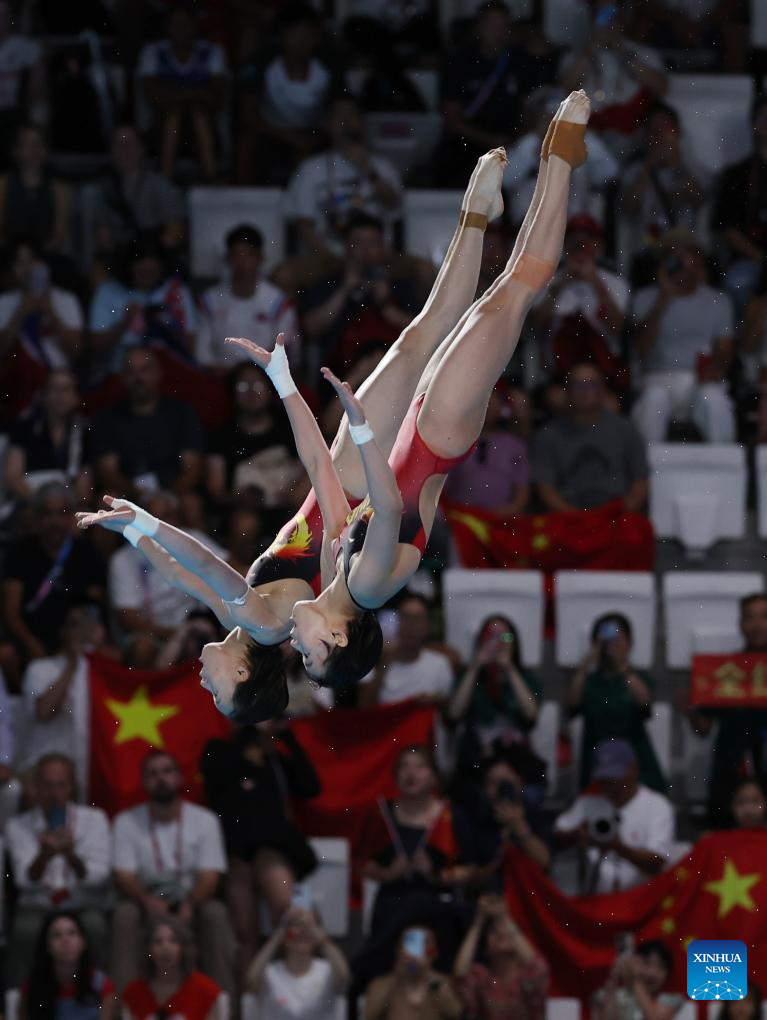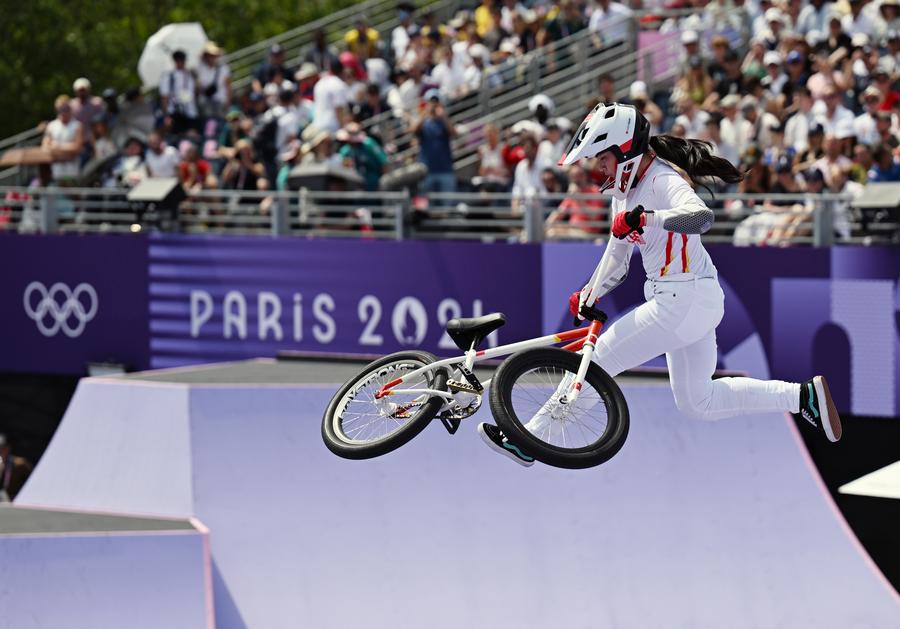Young Chinese divers dazzle, as nation sees breakthroughs in swim sprint and BMX freestyle

China, known as a diving superpower, has earned bragging rights for its “bicycle kingdom” status as well, landing historic gold with a victory on two wheels at the Paris Olympics.
Competing in elite sports involves athletes defying gravity quite often, though perhaps few of Deng Yawen’s peers have dazzled with the same level of complication as she did on her bike on July 31 in Paris.
With bar spins, high-flying flips, and then the killer trick of double tail whips — twice, no less — the Chinese favorite Deng, a runner-up in qualifications, brought oohs and aahs from the crowd at the La Concorde in the heart of Paris. She executed her second run almost flawlessly to score a field-high 92.6 points and finish on top of the podium in the BMX freestyle park final.
It was China’s first Olympic gold medal in the young urban sport, which made its Olympic debut at Tokyo 2020, and its third across all cycling disciplines overall, following two golds in the women’s track cycling team sprint at Rio 2016 and Tokyo 2020.
“Looking back, and regardless of what the future holds, definitely it was the best decision of my life,” said Deng, a junior track and field athlete who chose to join the new Chinese BMX freestyle program in 2017.
“As uncertainly risky as it looked back then, it has paved the way to where I am now. And I really appreciate myself for making that bold switch at that time and all the hard work I’ve put in on the way,” said Deng, an 18-year-old native of Southwest China’s Sichuan province.
Perris Benegas of the United States won silver with 90.7 points from her second run, while Australian rider Natalya Diehm settled for bronze with an 88.8-point first run.
Freestyle park in BMX, or “bicycle motocross”, involves athletes riding across a park course set up with jumps, ramps, and rails to perform wheel spins, flips, and tail whips, among other tricks, within 60 seconds in each run. The Olympic final features the top eight from qualification rounds and ranks riders by their best run out of two attempts.

Deng set the tone with an impressive 92.5 in her first run, building an early lead in the field. But she had to deliver under pressure in her second, after Benegas scored 90.7 points in her second run to gain on Deng, and Deng’s teammate Sun Jiaqi fell on both her runs.
Deng rose to the occasion, holding her nerve to improve her score to 92.6 points in the second attempt to secure the gold amid rousing cheers at the iconic Parisian square.
Meanwhile, China’s diving super-teen team of 17-year-old Quan Hongchan and 18-year-old Chen Yuxi kept the diving “dream team” on course for a clean sweep of all eight golds in Paris by winning the squad’s third in women’s synchronized 10-meter platform in the morning session.
Team China has now won every single gold medal — seven in a row — in this event since its Olympic inclusion at Sydney 2000. The world champion pair put their collective pursuit of perfection on full display by finishing five rounds of dives, all in optimal “rip entry”, a delicate entry that appears splashless and has been mastered by China’s elite divers.
Jo Jin-mi and Kim Mi-rae of the Democratic People’s Republic of Korea won silver, the nation’s first-ever diving medal at the Olympics, while British pair Andrea Spendolini-Sirieix and Lois Toulson completed the podium in third.
“Everything is close to perfection,” Spendolini-Sirieix said of her Chinese rivals after the final. “They are the best of the best. I’m always clapping just watching their dives. They go in the water like they are sleeping.”
The swimming stories have been mixed. China’s freestyle swimmer Pan Zhanle has thanked a scientific training program for his world record-breaking feat at the Paris Olympics as the country celebrates its first men’s Olympic swimming gold medal in a sprint event.
Entering the final session on July 31 under huge pressure to end China’s gold medal drought in the Paris pool, the 19-year-old sent the capacity crowd at the La Defense Arena into a frenzy by clocking 46.40 seconds in the 100m freestyle final, to deliver the team a long-anticipated gold and take an incredible 0.4 seconds off his own previous world record time.

It was the first world record broken in any swimming competition at the Paris Games and has significantly lifted the Chinese team’s spirit following a series of near-misses of the podium top spot in earlier events.
Pan’s record-breaking performance came after having completed a rigorous doping test program, before and during the Paris Games, with zero positive results, which has sent out a strong statement on the improvement and integrity of Chinese swimmers.
“I just swam the race perfectly today and made a strong impression for Chinese swimming. I hope this gold could boost the morale of the whole team,” Pan said at the post-final news conference.
“For Chinese swimming and for my country, I think it’s huge to prove that Chinese athletes could also prevail in another event in swimming.”
A young talent specifically strong in his final split push, Pan made his presence felt at February’s world championships in Doha by setting his previous world record of 46.80 seconds in his stunning leadoff leg in China’s gold-winning men’s 4x100m relay.
Asked how he managed to achieve such consistent improvement, Pan said it is all about hard working honestly under the right guidance.
“I took 21 doping tests from May to July prior to the Games and had no positive results at all. I cooperated with all the testing and stay confident that I am competing fair and clean,” Pan said.
“As far as my daily training routine, I did a lot of aerobics and endurance training to strengthen my push and kick in the final split.
“We have also been adopting a scientific underwater monitoring and analyzing system to review our techniques and strokes, so that we could train better and more effectively,” he said.
Yet, fellow swimmers Zhang Yufei and Qin Haiyang both missed out on gold in their first respective final sessions in Paris.
After being beaten to silver by just 0.05 seconds three years ago in Tokyo, Zhang had to come to terms with a second narrow defeat in an Olympic 100m butterfly final, won by Torri Huske of the United States on July 28, after having tried so hard and proved what was possible with a world championships title last year.
For three-time men’s breaststroke world champion Qin, his main takeaway from a disappointing 100m final and a 200m breaststroke semifinal, where he fell from hitting the turn first to an eventual seventh place finish, was to keep improving his mental game.
“I was solid in training, but I don’t know what went wrong today. My first 50m was as fast as expected, but somehow I messed up with my pace in the second split. I feel like I wasn’t mentally focused enough to pull it off,” Qin said after the final.


